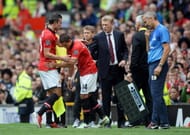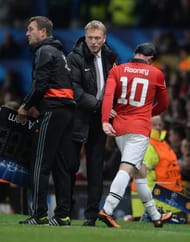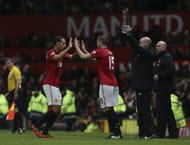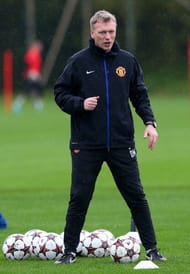Ring out the old, ring in the new
The season started with David Moyes entrusting Rio Ferdinand and Nemanja Vidic with defending responsibilities, but the duo’s problems are well-documented and were indeed on display for the world to see. Both prefer staying in the penalty box where they are literally giants, because once they move out of their comfort zone, their weaknesses are there for all and sundry to see.
Because of their willingness to stay in the box and not venture out, Manchester United as a team are forced to play deeper and concede possession. Pressing becomes a major issue when a team plays deep, and hence opponents get time and space to dictate the game.
Lately, Jonny Evans, Phil Jones and Chris Smalling have been tried out at CB with varying degrees of success. Evans seems to be the most impressive of the three and he is the one who tries to build-up play from the back by using accurate, long passes.
For a team that is struggling to maintain possession and force themselves on the opposition, a ball-playing defender like Evans could be just what they need. Ferdinand’s star has been on the wane since the last two years, but Ferguson “managed” him through the tough times.
Evans and Jones were brought in for a reason, to be the future CBs. Evans has had an impressive last two seasons under Ferguson, so it’s not like he is a rookie. He has played in the big matches and performed well.
Go with the future Mr. Moyes, they are more than capable of holding their own. Ferdinand and Vidic still have a part to play, but perhaps not in every single game.
Rotate strikers
It’s difficult for a manager to drop a player who scored 30-odd goals the season before. It’s even more difficult to drop him when you consider the fact that he was instrumental in the team winning the league last season.
But that is all in the past, and the present scenario suggests Robin van Persie is in need of a break. Either he has been overplayed to the extent that he is burnt out, or the motivation to succeed isn’t as strong as last season. Whatever the case, van Persie looks jaded and seems to have lost that edge that made him impossible to defend against last season.
Perhaps rotation is the answer.
In Welbeck and Hernandez, Manchester United have two quality strikers with different characteristics to the Dutchman. While Welbeck is all action and drops back to help in the build-up, Hernandez likes to stretch oppositions and create more space for the likes of Rooney and Kagawa.
A goal or two from Hernandez and Welbeck could certainly to be strong motivation for van Persie to up his game. Why, it only took one special performance by Alexander Buttner to make Patrice Evra sit up and take notice. And after that, Evra’s form improved drastically, no doubt on account of fear of losing his place in the starting XI.
From time to time, even world-class players need the right motivation to go out and play. And giving more game-time to Welbeck and Hernandez could fire up van Persie again.
Have the guts to take off Rooney when he is not playing well
You know what they say about Rooney, right? When he is good, he is great. But when he is bad, he is awful to watch.
Dropping Wayne Rooney was an issue that Ferguson avoided during his reign, so as to not upset the fan favourite. Even when it was clear that Rooney was having a stinker, Ferguson, as far as possible, tried to keep him on the field in the hopes that Rooney would do something special.
There’s nothing wrong with giving a world-class player like Rooney more game-time even on their bad days, because that’s what world-class players do. They produce moments of magic even when they are playing badly.
But the other side of the story is the impact this has on the other players in the team. If Rooney is untouchable, then the likes of Kagawa and Welbeck have every right to be miffed. If bad performances from Rooney are overlooked time and again, then it sets a bad precedent – no matter how bad Rooney is, he will not be taken off.
That is something that Moyes can correct. Against Southampton, Rooney did not have a great day. In fact, he had a terrible game, constantly losing possession and unable to do anything productive with the ball. But he still lasted 87 minutes before being substituted.
Had Moyes had the courage to remove Rooney sooner and bring on another player, it would have sent a message to the entire squad, along with Rooney – no one is guaranteed a spot, you have to earn it. Even if you have scored 200-odd goals for the club.
Use substitutions wisely
Against Southampton, Evans and Jones started in the centre of defense. United played well against a Southampton team that has started the season strongly, and the home team looked good value to keep a clean sheet and hang on for three points.
What did Moyes do? He first removed Fellaini and brought on Welbeck in the 76′. At a time when Southampton were dominating possession, it seemed crazy to bring off the defensive midfielder and bring on a striker. Perhaps Moyes wanted to give his players an option to clear the ball and counter on the break through Welbeck’s pace, yet that is still no reason to remove Fellaini.
The next substitution saw Smalling come on for Rooney in the 87′. Jones is then asked to move into the defensive midfield role so that Smalling can go to CB. This disrupts the Evans-Jones partnership which had played really well till then. Two minutes later, in the 89′ minute, Lallana scores from a simple ball into box, with Jones unsure of who he is marking. Moyes’s substitution and directions created chaos, which is what led to the equaliser.
The same pattern can be found in the match against Manchester City, where United were thoroughly outplayed. At 4-0 down in the 51′, Moyes brought on Cleverly for Young – a move which enabled United to at least control possession even if that possession was sterile. Yet, after City retreated and absorbed the pressure, the match was crying out for an attacker to be brought on for one final push.
Sure, United would probably have not won or even drawn the game after being down 4-0. But if Kagawa, Nani and Hernandez are waiting on the bench, surely one or two of them could be brought on, to change things up. Maybe perhaps fire a last salvo and salvage pride?
Instead, Moyes made no further changes, presumably happy with the result. And City saw the game out.
Maybe this is nitpicking, but Moyes’s substitutions often leave fans scratching their heads, unsure what to make of them. The substitutions are not confidence-inspiring and instead have damaged the team considerably. Wiser use of substitutions could be one way to improve the team’s standing.
Less rigidity, more tactical flexibility
There was a time when Sir Alex was considered tactically inept and unwilling to compromise on the team’s shape, but over time Ferguson mastered the art of rotating the team and the formation depending on the opposition’s strengths and weaknesses.
If it was a European game, a 4-5-1 with a packed midfield. A derby match? More home-grown or academy players (because of the importance that a derby holds for these players). Visiting Stoke? Pack the side with players who are good in the air and on the counter. Match-by-match, Ferguson would change his side, sometimes even giving up possession in favour of eking out a result.
With Moyes, there have been no pleasant surprises. The team is more or less setup in the same manner, for every game! It’s entirely possible that opposition managers are now able to guess Moyes’s team before the match, thereby removing the element of surprise.
Very few teams keep playing with the same formation over and over again if it brings no success. And the ones that have their formations and roles set rigidly, they have a unique way of playing fooball. See Barcelona, Dortmund or even Bayern Munich this season.
With a highly talented squad at his disposal, Moyes has the chance to design a new framework or simply rejig the team. Start with three strikers, with Kagawa behind them and outscore the opposition. Or forgo the wingers and go with a packed midfield to control the match. Heck, even Ferguson tried the diamond in his last season, albeit with moderate success.
There’s no set formula for achieving success, and sometimes players need to be set free instead of being shackled by the system. Perhaps Moyes does not have the courage to experiment, considering results have not been optimum.
But then that’s what separates good managers from the great ones – high risk, high reward.




